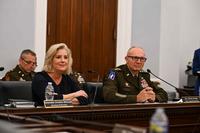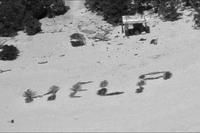MARINE CORPS BASE CAMP PENDLETON, Calif. — On a late Thursday afternoon, Staff Sgt. Javier Acosta, a platoon sergeant with Charlie Company, 3rd Assault Amphibian Battalion, and Sgt. Ronny Pool, a platoon sergeant with Headquarters and Service Company, Headquarters Battalion, 1st Marine Division, were both on their routine commute to their respective homes on Sept. 27, 2012.
As they slowed to a stop at an intersection of Winchester Road in Temecula, Calif., both Marines noticed a change in the traffic pattern. They scanned their surroundings for the cause and quickly noticed that a motorcycle accident occurred near the intersection.
Without hesitation, Acosta, a native of Santa Clarita, Calif., and Pool, a native of De Soto, Kan., snapped into action toward the scene of chaos. Unbeknownst to them, their actions over the next 30 minutes would save a man’s life.
Acosta was on his way home to Winchester, Calif., with his two children when he noticed the accident’s victim lying on the ground.
“I saw where the accident happened, I noticed the individual rolling around on his side,” said Acosta. “At that point I told my [eldest] son to take the wheel and park the car on a safe spot. Then I jumped out of the car and ran to the individual on the ground.”
“As I approached the individual, I noticed that his left leg was almost completely severed off,” Acosta explained. “I kept looking around to see if there was anyone else in the area who can help me out. I noticed a person walking around and I told him to call 9-1-1, which was my first instinct.”
About two or three minutes after Acosta approached the victim, another Marine approached the scene carrying a trauma kit.
Pool was driving to his home in Hemet, Calif., when he noticed the accident. Without hesitation, he drove his truck towards the scene, and parked to block traffic from the accident’s victim. Pool then grabbed his trauma kit, and ran towards Acosta and the victim.
“When I got there, there was already someone holding the [victim’s] head,” said Pool. “I didn’t know until later on that he was a Marine because he was wearing [civilian clothes]. He immediately asked me for a tourniquet, because from what I could see, the individual had his leg severed and we needed to stop the bleeding.”
“I looked in my bag and realized that I didn’t have any more tourniquets,” Pool explained. “The next thing I know [Acosta] told me to take my [Marine Corps Martial Arts] belt and use it as a tourniquet around his leg.”
After further assessing the victim’s injuries, Acosta had removed the victim’s motorcycle helmet and held his neck straight to protect from further spinal injuries, while Pool kept his knee on the femoral artery to keep constant pressure against the bleeding.
“At that point, some paramedic students came over to help us out,” Acosta recalled. “We kept asking him questions to keep him conscious.”
“[Acosta] and I were going through the combat life saver steps we know,” said Pool. “We used the civilians that were there to redirect the traffic until the paramedics arrived.”
When the paramedics arrived, Acosta and Pool provided the victim’s vital signs, and helped them load the victim onto the gurney. As the ambulance’s sirens faded away, the two Marines spoke for a short time and went their separate ways.
Acosta and Pool both credit the successfulness of their lifesaving skills to training received in the Marine Corps.
“We get trained in basic first aid beginning at bootcamp,” explained Acosta. “Pool and I have received training in lifesaving skills, so we used the tools we had at the time. If Pool didn’t show up when he did, I don’t think we could have saved the individual.”
Both Marines firmly believe that skills they’ve acquired through training in the Marine Corps, are valuable to both their Corps and community.
“We were the first ones there and I didn’t see anyone else,” said Pool. “The ethical thing to me was to render help. We’ve had the training as Marines, so why just serve our Marines, and why not serve the community as well?”


























